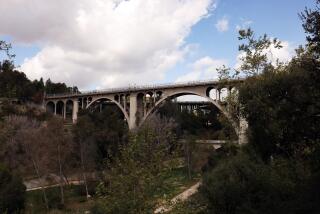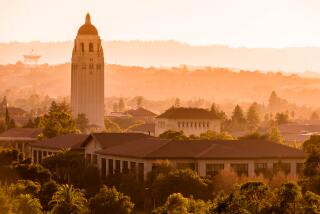His life in chocolate was not always smooth
- Share via
“HERSHEY” is a charming and absorbing account of one of American capitalism’s eccentric visionaries whose business success was matched by his devotion to social improvement. A little more than a hundred years ago, Milton S. Hershey, a child of the Mennonite tradition of Pennsylvania, founded what became the world’s largest chocolate factory, built as a brand-new town to house its workers in comfort. The factory’s profits were also used to create a school for underprivileged boys.
A century later, time has so enlarged the fortune that Hershey left -- its value has grown to $7 billion -- and so altered the social setting of the Hershey School that the school and Hershey Co. have faced great pressure to change their charters. A proposed sale of the company was blocked in 2002, but the struggle over its future continues.
Hershey died in 1945 at the age of 88, but to this day there are those in the Lebanon Valley town he built near Lancaster and Harrisburg who still ask “What would M.S. do?” Hershey, who was commonly referred to as “The Founder,” seems to have been a psychologically elusive man. Michael D’Antonio, the author of “Hershey,” a thorough, unauthorized biography, reports that lack of written documentation makes the man a hard subject to pin down. Certainly D’Antonio’s Hershey seems more like a man glimpsed from time to time standing briefly in the twilight than a figure presented in the full light of day.
Yet the main outline of his life and works is plain enough to see. The son of one of those ever-optimistic, never successful American fathers who seemed to pop up throughout the 19th century, Hershey appeared to be resolved from the beginning to make it on his own. At an early age he entered the candy business, specializing in caramel, and failed. But -- this is an ever upward-bound story of 19th century America -- he persevered and not only made a success of caramel but also figured out how to make the suave-tasting milk chocolate that is the basis of the Hershey bars and kisses we know today.
“Caramels are too rich to eat every day,” Hershey reasoned in the 1890s. “I am going to concentrate more and more on making chocolate because I believe it will be a more permanent business in the long run.” He was definitely onto something -- when he died, Hershey was producing 90% of all the milk chocolate sold in the United States.
Hershey was rich by the time he met Catherine Sweeney, a Roman Catholic 15 years his junior. They were married in St. Patrick’s Cathedral in New York in 1898, and people in the buttoned-up Pennsylvania German culture of the Lebanon Valley gossiped, partly because of her religion, partly because of her past, which was obscure. She was subject to illness and worsened over time: D’Antonio speculates that her “locomotor ataxia” could well have been the result of syphilis.
By the time he started the Hershey Co. in 1905, Hershey was in full accord with the social betterment philosophy of the American Progressive movement, exemplified by President Theodore Roosevelt: “When a man gets very rich, he either gets very selfish or his money worries him.”
Hershey assuaged his worries on this point by founding his company town and the school for boys. Hershey, Pa., D’Antonio writes, was to be “a perfect American town in a bucolic natural setting where healthy, right-living and well-paid workers lived in safe, happy homes.” School, town and factory fulfilled their founder’s hopes for decades. Only in the Depression-stressed years of the 1930s and later did strains show: Unions appeared, and the school came to be regarded as out of date.
Hershey was an inconstant boss, now too strict, now too easy, traits that grew more pronounced as he grew older. And as he did he seemed to have paid less attention. While his wife was still living, he set up a large sugar-cane operation in Cuba, and he spent more and more time there, especially after her death. He took up gambling, making bets of $50,000 a day.
D’Antonio seems as baffled by this aspect of the founder’s personality as the reader. But, considering the scarcity of details about Hershey’s life, D’Antonio has delivered an intriguing portrait of a true American individualist and his time.
Anthony Day is a regular contributor to Book Review.
More to Read
Sign up for our Book Club newsletter
Get the latest news, events and more from the Los Angeles Times Book Club, and help us get L.A. reading and talking.
You may occasionally receive promotional content from the Los Angeles Times.










